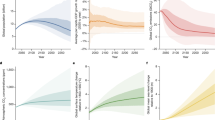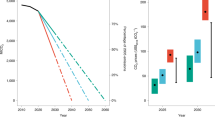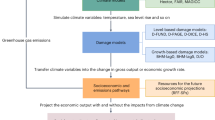Abstract
Many studies have estimated the social cost of carbon (SCC). We critically evaluate SCC estimates, focusing on omitted cost categories, discounting, uncertainties about damage costs and risk aversion. This allows for the calculation of a lower bound to the SCC. Dominant SCC values turn out to be gross underestimates, notably, but not only, for a low discount rate. The validity of this lower bound is supported by a precautionary approach to reflect risk aversion against extreme climate change. The results justify a more stringent climate policy than is suggested by most influential past studies.
This is a preview of subscription content, access via your institution
Access options
Subscribe to this journal
Receive 12 print issues and online access
$209.00 per year
only $17.42 per issue
Buy this article
- Purchase on Springer Link
- Instant access to full article PDF
Prices may be subject to local taxes which are calculated during checkout
Similar content being viewed by others
References
Stern, N. The Economics of Climate Change: The Stern Review (Cambridge Univ. Press, 2007).
Tol, R. S. J. The economic impact of climate change. J. Econ. Persp. 23, 29–51 (2009).
Pearce, D. W. The social cost of carbon and its policy implications. Oxford Rev. Econ. Pol. 19, 362–384 (2003).
Nordhaus, W. D. Integrated Economic and Climate Modeling (Cowles Foundation for Research, 2011).
US Department of Energy Final Rule Technical Support Document (TSD): Energy Efficiency Program for Commercial and Industrial Equipment: Small Electric Motors, Appendix 15A (US Government, 2010).
Ayres, R. U. & Walters, J. Greenhouse effects: Damages, costs and abatement. Environ. Res. Econ. 1, 237–270 (1991).
Daily, G. C., Ehrlich, P. R., Mooney, H. A. & Ehrlich, A. H. Greenhouse economics: learn before you leap. Ecol. Econ. 4, 1–10 (1991).
Broome, J. Counting the Cost of Global Warming (White House Press, 1992).
Barker, T. A review of Managing the global commons: the economics of global change by W. D. Nordhaus. Energy Environ. 7, 85–88 (1996).
Azar, C. Are optimal CO2 emissions really optimal? Four critical issues for economists in the greenhouse. Environ. Res. Econ. 11, 301–315 (1998).
Neumayer, E. Global warming: discounting is not the issue, but substitutability is. Energy Policy 27, 33–43 (1999).
Spash, C. L. Greenhouse Economics (Routledge, 2002).
DeCanio, S. J. Economic Models of Climate Change: A Critique (Palgrave-Macmillan, 2003).
van den Bergh, J. C. J. M. Optimal climate policy is a utopia: from quantitative to qualitative cost-benefit analysis. Ecol. Econ. 48, 385–393 (2004).
Padilla, E. Climate change, economic analysis and sustainable development. Environ.Values 13, 523–544 (2004).
Ackerman F. & Finlayson, I. J. The economics of inaction on climate change: a sensitivity analysis. Clim. Policy 6, 509–526 (2007).
Maréchal, K. The economics of climate change and the change of climate in economics. Energy Policy 35, 5181–5194 (2007).
Gowdy, J. M. Behavioral economics and climate change policy. J. Behav. Econ. Organ. 68, 632–644 (2008).
Tol, R. S. J. The social cost of carbon: Trends, outliers and catastrophes. Economics 2, 1–22 (2008).
Ackerman, F., DeCanio. S. J., Howarth, R. B. & Sheeran, K. Limitations of integrated assessment models of climate change. Climatic Change 95, 297–315 (2009).
Ackerman, F., Stanton, E. A. & Bueno, R. Fat tails, exponents, extreme uncertainty: Simulating catastrophe in DICE. Ecol. Econ. 69, 1657–1665 (2010).
van den Bergh, J. C. J. M. Safe climate policy is affordable — 12 reasons. Climatic Change 101, 339–385 (2010).
Ackerman, F. & Munitz, C. Climate damages in the FUND model: A disaggregated analysis. Ecol. Econ. 77, 219–224 (2012).
Tol, R. S. J. On the uncertainty about the total economic impact of climate change. Environ. Res. Econ. 53, 97–116 (2012).
Nordhaus, W. D. A Question of Balance: Weighting the Options of Global Warming Policies (Yale Univ. Press, 2008).
Anthoff, D., Rose, S., Tol, R. S. J. & Waldhoff, S. The time evolution of the social cost of carbon: An application of FUND Economics Discussion Papers 2011–44 (Kiel Institute for the World Economy, 2011).
Hope, C. The marginal impact of CO2 from PAGE2002: an integrated assessment model incorporating the IPCC's five reasons for concern. Integrat. Assess. J. 6, 19–56 (2006).
Waldhoff, S., Anthoff, D., Rose, S. & Tol, R. S. J. The marginal damage costs of different greenhouse gases: An application of FUND. Economics 2011–43 (2011).
Hope, C. The social cost of CO2 from the PAGE09 model. Economics 2011–39 (2011).
Interagency Working Group on Social Cost of Carbon Technical Update of the Social Cost of Carbon for Regulatory Impact Analysis under Executive Order 12866 (US Government, 2013). http://go.nature.com/9ZtMyu
Johnson, L. T. & Hope, C. The social cost of carbon in U.S. regulatory impact analyses: An introduction and critique. J. Environ. Stud. Sci. 2, 205–221 (2012).
Marten, A. L. & Newbold, S. C. Estimating the social cost of non-CO2 GHG emissions: Methane and nitrous oxide. Energy Policy 51, 957–972 (2012).
Demeritt, D. & Rothman, D. Figuring the costs of climate change: an assessment and critique. Environ. Plan. A 31, 389–408 (1999).
Tol, R. S. J. The marginal damage costs of carbon dioxide emissions: an assessment of the uncertainties. Energy Policy 33, 2064–2074 (2005).
Stern, N. The structure of economic modeling of the potential impacts of climate change: grafting gross underestimation of risk onto already narrow science models. J. Econ. Lit. 51, 838–859 (2013).
Cline, W. R. The Economics of Global Warming (Institute for International Economics, 1992).
Roemer, J. E. The ethics of intertemporal distribution in a warming planet. Environ. Res. Econ. 48, 363–390 (2011).
Nordhaus, W. D. A review of the Stern review on the economics of climate change. J. Econ. Lit. XLV, 686–702 (2007).
Dasgupta, P. Discounting climate change. Journal of Risk and Uncertainty 37, 141–169 (2008).
Howarth, R. B. & Norgaard, R. B. in Handbook of Environmental Economics (ed. Bromley, D.) 111–138 (Blackwell, 1995).
Brekke, K. A. & Johansson-Stenman, O. The behavioural economics of climate change. Oxford Rev. Econ. Pol. 24, 280–297 (2008).
Cline, W. R. Yale Symposium on the Stern Review Ch. 6 (Yale Center for the Study of Globalization, 2007); http://go.nature.com/95uCm5
Hueting, R. Why environmental sustainability can most probably not be attained with growing production. J. Clean. Prod. 18, 525–530 (2010).
Gollier, C. Ecological discounting. J. Econ. Theory 145, 812–829 (2010).
Conceição, P., Zhang, Y. & Bandura, R. in Human Development Report 2007/2008, Fighting Climate Change: Human Solidarity in a Divided World Occasional Paper 2007/19 (Human Development Report Office, 2007).
Cline, W. R. The Economics of Global Warming (Institute for International Economics, 1992).
Stern, N. & Richard T. Ely lecture: The economics of climate change. Am. Econ. Rev. 98, 1–37 (2008).
Arrow, K. et al. Determining benefits and costs for future generations. Science 341, 349–350 (2013).
Botzen, W. J. W. Managing Extreme Climate Change Risks through Insurance (Cambridge Univ. Press, 2013).
IPCC Climate Change 2007: The Physical Science Basis. (eds Solomon, S. et al.) (Cambridge Univ. Press, 2007).
Field, C. B. et al. (eds) Managing the Risks of Extreme Events and Disasters to Advance Climate Change Adaptation. (IPCC, Cambridge Univ. Press, 2012).
Hope, C. The marginal impact of CO2 from PAGE2002: An Integrated Assessment Model incorporating the IPCC's five reasons for concern. Integrat. Assess. J. 6, 19–56 (2006).
Weitzman, M. L. On modeling and interpreting the economics of catastrophic climate change. Rev. Econ. Stats. 91, 1–19 (2009).
Weitzman, M. L. GHG Targets as Insurance Against Catastrophic Climate Damages Working Paper 16136 (National Bureau of Economic Research, 2010).
Weitzman, M. L. Risk-adjusted gamma discounting. J. Environ. Econ. Manage. 60, 1–13 (2010).
Botzen, W. J. W. & van den Bergh, J. C. J. M. How sensitive is Nordhaus to Weitzman? Climate policy in DICE with an alternative damage function. Econ. Lett. 117, 372–374 (2012).
Pycroft, J., Vergano, J., Hope, C., Paci, D. & Ciscar, J. C. A tale of tails: Uncertainty and the social costs of carbon dioxide. Economics 5, 1–29 (2011).
Ceronsky, M., Anthoff, D., Hepburn, C. & Tol, R. S. J. Checking the Price Tag on Catastrophe: The Social Cost of Carbon under Non-Linear Climate Response. Working Paper 392 (ESRI, 2011).
Dietz, S. High impact, low probability? An empirical analysis of risk in the economics of climate change. Climatic Change 108, 519–541 (2011).
Ackerman, F. & Stanton, E. A. Climate risks and carbon prices: Revising the social cost of carbon. Economics 6, 1–25 (2012).
Hanemann, W. M. What is the Economic Cost of Climate Change? (eScholarship, 2008).
Kousky, C., Kopp, R. E. & Cooke, R. Risk premia and the social cost of carbon: A review. Economics 5, 1–24 (2011).
Botzen, W. J. W. & van den Bergh, J. C. J. M. Bounded rationality, climate risks and insurance: Is there a market for natural disasters? Land Econ. 85, 266–279 (2009).
Hope, C. Discount rates, equity weights and the social cost of carbon. Energy Econ. 30, 1011–1019 (2008).
Dietz, S., Hepburn, C. & Stern, N. in Arguments for a Better World: Essays in Honour of Amartya Sen. (eds Basu, K. & Kanbur, R.) Ch. 19 (Oxford Univ. Press, 2009).
Carlsson, F., D. Daruvala & Johansson-Stenman, O. Are people inequality-averse, or just risk averse? Economica 72, 375–396 (2005).
Beckerman, W. & Hepburn, C. J. Ethics of the discount rate in the Stern Review. World Econ. 8, 187–210 (2007).
Anthoff, D., Tol, R. S. J. & Yohe, G. W. Risk aversion, time preference, and the social cost of carbon. Environ. Res. Lett. 4, 1–7 (2009).
Crost, B. & Traeger, C. Risk and Aversion in Integrated Assessment of Climate Change Working paper 1104R (CUDARE, 2011).
Froyn, C. B. Decision criteria, scientific uncertainty, and the global warming controversy. Mitig. Adapt. Strat. Glob. Change 10, 183–211 (2005).
Anthoff, D. & Tol, R. S. J. Climate policy under fat-tailed risk: An application of FUND. Ann. Op. Res. (in the press).
Loulou, R. & Kanudia, A. Minimax regret strategies for greenhouse gas abatement: Methodology and application. Op. Res. Lett. 25, 219–230 (1999).
Iverson, T. Communicating trade-offs amid controversial science: Decision support for climate policy. Ecol. Econ. 77, 74–90 (2012).
Randall, A. We already have risk management – Do we really need the precautionary principle? Int. Rev. Environ. Resource Econ. 3, 39–74 (2009).
Randall, A. Risk and Precaution (Cambridge Univ. Press, 2011).
Iverson, T. & Perrings, C. Precaution and proportionality in the management of global environmental change. Glob. Environ. Change 22, 161–177 (2012).
Sunstein, C. R. Laws of Fear: Beyond the Precautionary Principle. The Seeley Lectures (Cambridge Univ. Press, 2005).
Quiggin, J. Complexity, climate change and the precautionary principle. Environ. Health 7, 15–21 (2007).
Acknowledgements
We are grateful to five reviewers for comments and suggestions. JvdB received financial support from the European Commission through the FP7 project WWW.forEUrope (grant agreement nr. 290647). WB received financial support from a VENI grant from the Netherlands Organisation for Scientific Research (NWO) and from the European Commission through the FP7 project ENHANCE (grant agreement nr. 308438).
Author information
Authors and Affiliations
Contributions
J.vdB. and W.B. wrote the paper jointly.
Corresponding author
Ethics declarations
Competing interests
The authors declare no competing financial interests.
Rights and permissions
About this article
Cite this article
van den Bergh, J., Botzen, W. A lower bound to the social cost of CO2 emissions. Nature Clim Change 4, 253–258 (2014). https://doi.org/10.1038/nclimate2135
Received:
Accepted:
Published:
Issue Date:
DOI: https://doi.org/10.1038/nclimate2135
This article is cited by
-
Social cost of carbon estimates have increased over time
Nature Climate Change (2023)
-
Economic valuation of wildlife conservation
European Journal of Wildlife Research (2023)
-
Is Diversification a Suitable Option to Reduce Drought-Induced Risk of Forest Dieback? An Economic Approach Focused on Carbon Accounting
Environmental Modeling & Assessment (2022)
-
Using Multidisciplinary Analysis to Develop Adaptation Options against Extreme Coastal Floods
International Journal of Disaster Risk Science (2022)
-
Coal-exit health and environmental damage reductions outweigh economic impacts
Nature Climate Change (2020)



